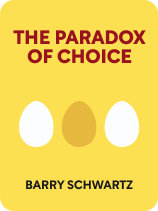

This article is an excerpt from the Shortform book guide to "The Paradox of Choice" by Barry Schwartz. Shortform has the world's best summaries and analyses of books you should be reading.
Like this article? Sign up for a free trial here .
What is the difference between a maximizer and a satisficer? Is there a benefit to being one over the other?
When it comes to deliberating options, there are two types of people: maximizers and satisficers. Maximizers will deliberate until they have chosen the best possible solution, while satisficers will select an option that is good enough. There are pros and cons to both types of personalities.
Continue reading to learn about the two types of deliberators, and learn which one will end up happier.
Are You a Maximizer or a Satisficer?
In his book The Paradox of Choice, Barry Schwartz distinguishes between two kinds of deliberators: Maximizers and satisficers. Both types of deliberators carefully consider their decisions, but in different ways:
- Maximizers accept only the best possible option.
- Satisficers accept an option that meets their standards.
Schwartz explores the differences between maximizing and satisficing, the pitfalls of being a maximizer, and why people maximize in the first place.
| The Theory Behind Satisficing The terms “maximizing” and “satisficing” were coined in 1956 by economist and psychologist Herbert A. Simon in the article “Rational Choice and the Structure of the Environment.” While the predominant economic theory at the time was that humans are rational actors who will gravitate toward the best possible choice, Simon argued that people are generally incapable of selecting the single best option from a wide range, but are able to choose an acceptable option that will satisfy their needs. Thus, Simon didn’t consider maximizing to be possible, a view that Schwartz echoes in arguing that trying to maximize is ultimately fruitless. Simon’s thoughts on making decisions in a society with expanded choice likely would be similar to Schwartz’s: Since people are naturally able to satisfice, but not to maximize, choosing options that are “good enough” instead of “perfect” is the better decision-making strategy. |
Maximizing vs. Satisficing
Maximizing and satisficing both come from a desire to make good decisions, but Schwartz argues that maximizing causes stress and eats up much more time than satisficing. If you maximize, you need assurance that every decision you make is the best one you could have made. Maximizers spend a lot of time examining alternative options, even if they have one or more satisfying options, or if the decision is inconsequential. Even though it’s not possible to examine every option, maximizers aspire to consider every option they can.
For example, if a maximizer is choosing a restaurant for dinner, they might spend hours on the decision. They’ll look up every restaurant in the area, read every menu, read all the online reviews, and ask friends for their favorites. Ultimately, they’ll end up wasting time they could’ve spent eating at one of the restaurants they considered.
A satisficer, on the other hand, would consider their options and have high standards, but once they find an option that meets those standards, they’ll likely accept it rather than continuing to explore options.
Schwartz explains that while maximizers might think satisficers are settling for second-best, what satisficers really aspire to is making good decisions without stressing over whether they’re missing out on better options. In the restaurant example, the satisficer will have an enjoyable dinner and will have saved themselves the time it took the maximizer to closely examine every possible option.
Schwartz believes that, while maximizers think they’re prioritizing their best interests, they’re actually causing themselves unhappiness. Satisficers, on the other hand, make their decisions more effectively.
| Are Maximizers Actually Unhappy? Some research on maximizing counters Schwartz’s belief that maximizing and unhappiness are correlated, instead suggesting that there’s no meaningful connection between them. Schwartz and other researchers use a metric called the Maximization Scale to determine whether people are maximizers or satisficers. However, a 2008 study contends that this scale is flawed, as it asks respondents questions that may not be directly correlated to maximizing (for example, whether they like to rank movies). The researchers created a narrower scale of measuring maximizing tendencies, and they found that, though maximizers are still more likely to feel regret, they’re just as happy as satisficers. |

———End of Preview———
Like what you just read? Read the rest of the world's best book summary and analysis of Barry Schwartz's "The Paradox of Choice" at Shortform .
Here's what you'll find in our full The Paradox of Choice summary :
- Why the more choices we have, the more stressed and indecisive we feel
- How to better navigate our choices, from groceries to health insurance
- Whether it's better to seek the best or accept "good enough"






